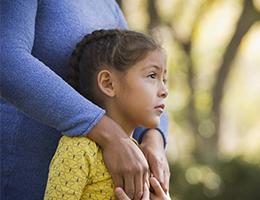
As a parent, caring for your child comes naturally. So if your child is sick, you may be willing to do anything you can do to help them get better.
Usually that means getting help from a doctor. But if the conventional treatment for your child's condition hasn't helped enough, you may decide to look into alternative or complementary medicine.
When that happens, it's important to take the time to learn about the treatment you're considering and make sure it's safe before you use it for your child.
Common alternative treatments
Alternative or complementary therapies differ from the standard treatments, such as prescription medicine or surgery. In children, they're most often used to treat chronic or other serious illnesses.
Some popular therapies you may hear about include:
- Vitamins, minerals or other dietary supplements.
- Herbal medicines.
- Yoga.
- Chiropractic care.
- Osteopathic manipulation.
- Acupuncture.
- Massage.
- Special diets.
- Homeopathy.
Many of these remedies are referred to as natural therapies, and some may help certain conditions.
Exercise caution when choosing
Before you decide to use an alternative treatment for your child, it's important to take some precautions.
According to the National Center for Complementary and Integrative Health (NCCIH), you should start by checking with your child's doctor. They can help make sure your child has received an accurate diagnosis and that the alternative therapy you're considering doesn't delay or replace the conventional care needed for your child's illness.
You'll also want to consider:
The potential risks. Medicines advertised as natural may not always be safe. For example, some supplements may contain harmful heavy metals, notes the American Academy of Pediatrics (AAP). And some remedies may interact with prescription medicines your child may already be taking.
Your child's doctor can help you learn if a therapy is safe for your child and has any side effects. If possible, bring the product to the appointment and show it to your child's doctor.
The available research. In general, there still isn't enough evidence to tell whether many popular remedies work or don't work, according to the NCCIH.
Here's something else to consider: Some therapies that work for adults may not have been tested in children. So you can't just assume that a treatment for adults is right for kids.
It's good to be skeptical, too, especially about products or treatments that make impressive claims such as miracle cures. They could be a health hoax.
The provider's qualifications. When choosing an alternative medicine provider for your child, it's important to be just as careful as you would when selecting a regular doctor. For instance, ask about the provider's experience working with children. Find out about their education, training and license. If your state does not require a license—the rules vary from state to state—you'll want to make sure the practitioner is certified by a professional organization, the AAP advises.
Also, find out if the alternative medicine provider will coordinate the care with your child's regular doctor. It's very important for all of the providers involved in your child's care to know about all of the treatments they're receiving and the progress they're making.
The cost and coverage. Some alternative treatments may not always be covered by insurance.
Want to know more?
If you want to learn more about an alternative or complementary therapy, you can:
- Ask your child's doctor if they think it will work.
- Research the therapy on a trusted website, such as one run by a national medical organization.
And if you do use an alternative treatment, contact your child's doctor if your child experiences any side effects with it.
Reviewed 3/31/2024